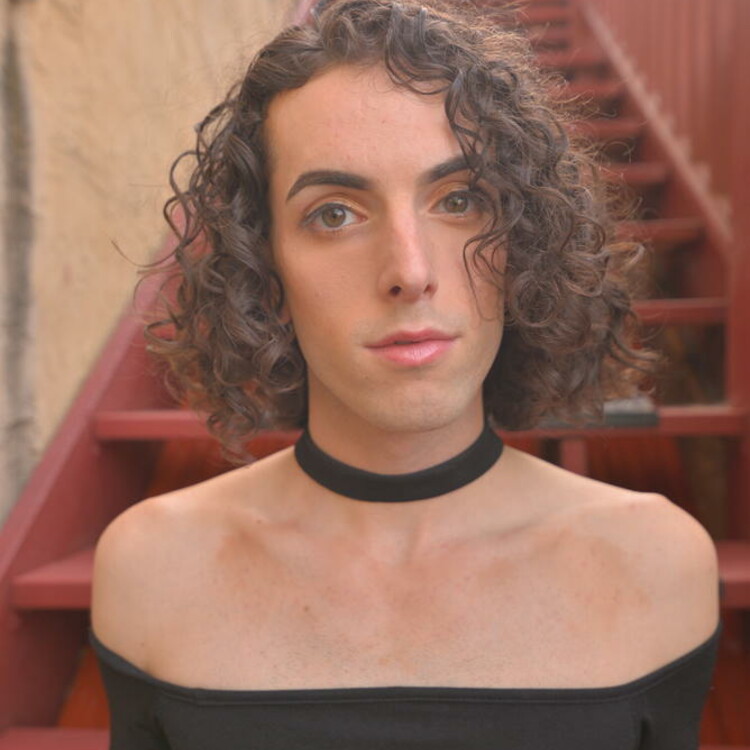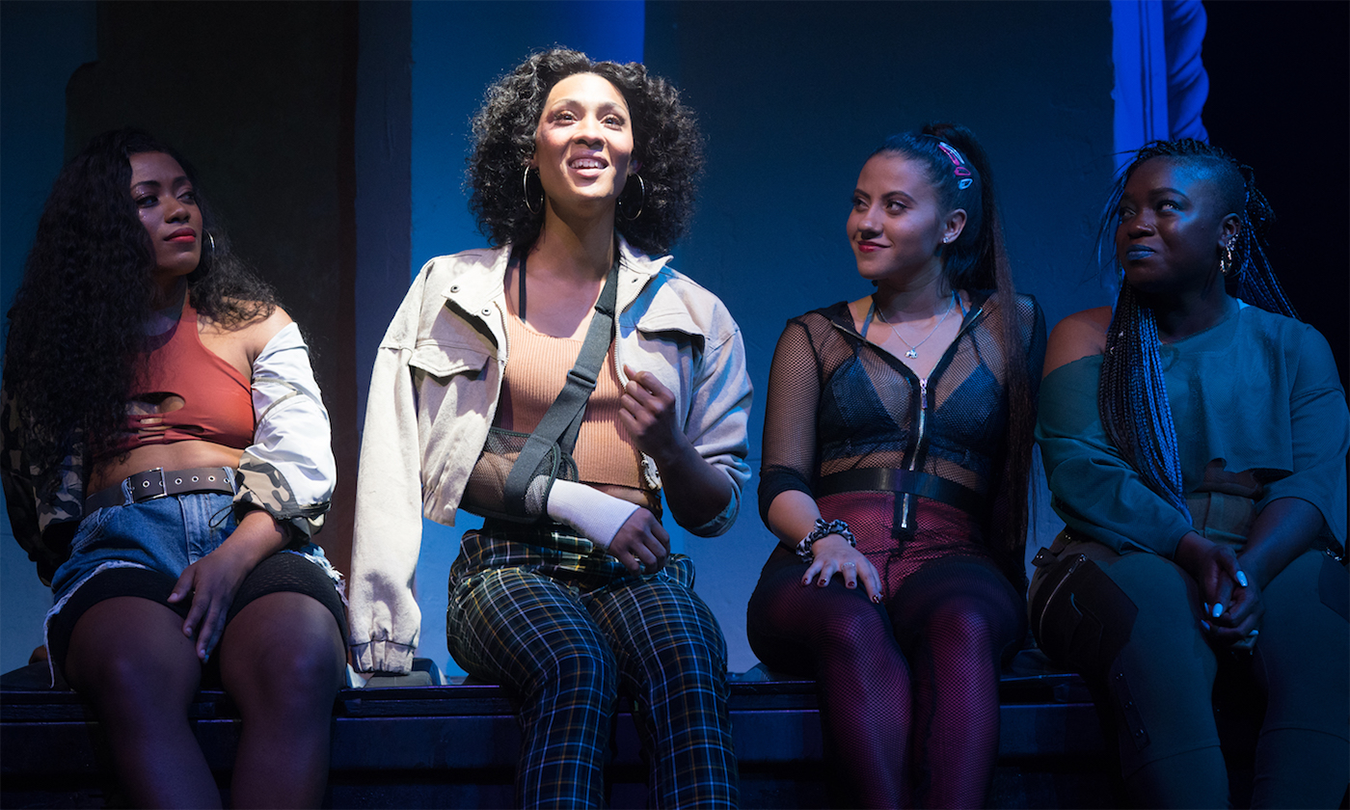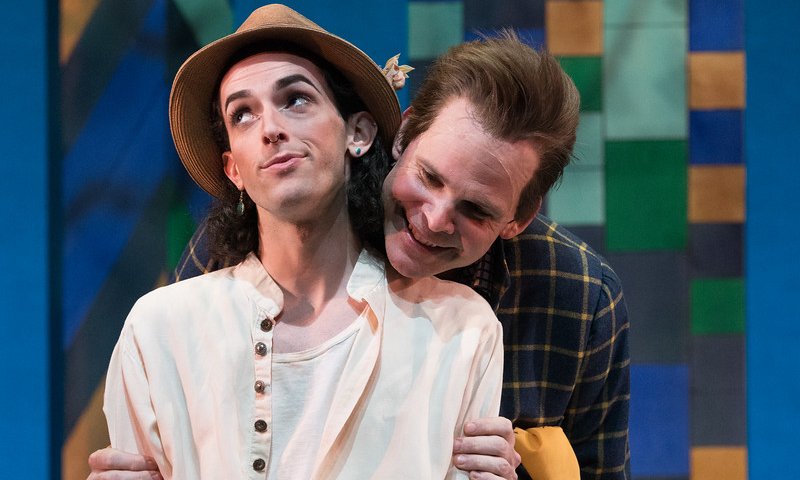There is an ever-growing number of trans and non-binary actors from coast to coast. I am proud to be one of them. Trans, non-binary, and gender non-conforming (which I collectively refer to as trans*) people have not been unconsciously repeating these gendered scripts without any question or scrutiny. In order to move from the space we’ve been assigned to the space it feels authentic to fill in our personal lives, we have had to (often painfully) detach and disassemble the entire imposing system and then put ourselves back together piece by piece in our own custom manner. Whether the end goal is to occupy another societally constructed identity or not, this work results in the formation of a being who is completely and uniquely their own: undefinable and limitless. This process of evaluation and deep mental exertion makes actors in the trans* community particularly skilled at performing gender. It’s something we produce with intentionality. So why is it so rare to see trans* actors on our nation’s large stages?
Often, theatre companies and casting directors, perhaps influenced by society’s essentialist reading of gender, look at trans* actors only when a breakdown includes an explicitly trans* role, which happens quite rarely. There are long-term systematic components that contribute to this reality. For one thing, major regional theatres are not often commissioning or producing plays by trans* playwrights like MJ Kaufman or Basil Kreimendahl. The developmental process of new plays takes a lot of time and often the investment of institutional resources. Additionally, very few cis playwrights include trans* and genderqueer characters in their works, let alone focus specifically on telling their stories. The saddening reality is that most plays feature solely cisgender characters, or at least that’s what we habitually assume unless we’re told otherwise.
Why is it so rare to see trans* actors on our nation’s large stages?
The Solution (For the Moment)
Why aren’t trans* actors hired to portray those roles? Why isn’t a trans woman trusted to perform femaleness with the dexterity and skill that a cisgender woman can? I’d argue that she has extremely specialized knowledge of what goes into occupying womanhood. Why do so-called creative teams worry about typecasting non-binary actors instead of encouraging them to go after the roles that most align with their spirit or the roles in which they’d find the greatest challenge? Many theatremakers seem slow to accept the idea that the gender identity of neither character nor actor can be assumed based on appearance alone. For some of us, the performance of gender is merely energetic—not something inextricably tied to our body, but rather the fulfillment of a societal idea. It is just as easily altered, embellished, or altogether removed as a costume.
My fear is that the answer to the questions above is that the inclusion of trans* actors in an otherwise cis story would necessitate some sort of conceptual explanation from the cis perspective for the benefit of a cis audience. That trans* bodies cannot simply exist within the container of a story without the creative team feeling pressure to qualify how this affects the narrative or clarify what sort of “statement” they are making on the piece. The insidious yet common belief is that trans* presence cannot be simply ordinary or mundane. By putting a trans* actor in a particular role, a producer or director must intentionally be changing or commenting on the story, right?
Wrong. To this sort of thinking: I call BS. The foundational principle of theatre is make-believe. It demands that the audience suspend their disbelief and buy into theatrical convention. It is literally fake. When watching Hamlet, everyone assumes the titular actor is not actually a prince. Audiences understand, however, that the character is a prince. They recognize that the rest of the cast treats this actor like a prince. He inhabits that role in that environment. So if a non-binary or transmasculine actor were playing Hamlet, could audiences not continue to suspend their disbelief if they assume that the character is cisgender? I imagine that such an actor would understand the conceit of performing maleness just the same as performing princehood. If the rest of the characters onstage still regarded Hamlet as a man, would not the same story be told? Why do we trust our imaginations so little?
By putting a trans* actor in a particular role, a producer or director must intentionally be changing or commenting on the story, right? Wrong.
Credit Where Credit Is Due
There are a few recent examples of inclusive casting in the American theatre for characters who are not explicitly trans*. Pasadena Playhouse’s production of Little Shop of Horrors last fall featured a trans woman of color, actor Mj Rodriguez, in the lead role of Audrey, a character who has nearly always been portrayed by a white, cis woman. Without altering the script, director Mike Donahue aimed to give audiences a modern production of Little Shop. Rodriguez was able to bring her unique life experiences to create an Audrey that audiences would recognize: a woman of both innocence and strength, vulnerability and power. The LA Times called her performance “moving in its simple, unsatiric honesty.” I imagine that fans of the original musical received everything they could expect.
For audience members who maintain a dual lens on both actor and character, casting a trans woman of color could unlock themes the play never held before. In this production, Audrey’s string of abusive relationships and her uncomfortable attempts to laugh at them echo a real world epidemic of violence against and subjection of trans women in our country. This inclusive choice costs the story nothing and adds layers of meaning for those who choose to interrogate them. Similarly, Alexandra Billings is currently on Broadway playing Madame Morrible in Wicked. With Billings in the role, audiences could decide to read the character as trans or not. The subtextual meanings can be deepened or unaltered, but the musical itself will not change. Nothing will explain why there is suddenly a trans body onstage as if trans* people are not in the world. The show will go on running as is, as usual.
Of course, it must be noted that both of these women have had extreme visibility from lead roles on prominent television shows. They are more than deserving of these groundbreaking opportunities, but what about lesser-known trans* actors? How can we continue to feature trans* artists who are not star names?
A brilliant example can be found in the final years of Chicago’s now-shuttered American Theater Company under the artistic direction of Will Davis. Over two years, I had the pleasure of being in the audience for productions of Men on Boats, Picnic, Kreimendahl’s We’re Gonna Be Okay, and the world premiere of Welcome to Jesus. Each of these productions featured one or more trans* actors, often as romantically desirable characters, alongside a host of other gender-imaginative casting choices. Not a single role among these plays was written to be explicitly trans*. However, as a trans man himself, Davis understands that gender diversity is a part of the community outside the theatre. Even if there is not yet a broad scope of plays with strong trans* narratives, why shouldn’t the reality of their presence be reflected onstage? Theatre has the opportunity, however fleeting, to portray a world that is more just and equitable than our own. Nothing demonstrated this more consistently than Davis’s two seasons with American Theatre Company.
Theatre has the opportunity, however fleeting, to portray a world that is more just and equitable than our own.
Now What?
The performing arts community has experienced baby steps for trans* visibility and inclusion over the last few years. Now, however, we are in a moment that necessitates participation and support from cisgender allies. We need those with decision-making power to make an investment in trans* artists. For many, this will mean initiating conversations that might be unfamiliar or potentially sensitive. For example, how might a casting director call in a non-binary actor for an audition in a manner that’s affirming? Is there a way to empower queer actors in this process? My advice would be to reach out and ask the individual.
Some actors are comfortable playing any gender and relish the opportunity to create a diverse resume. Other actors might not want to play the gender they were assigned at birth. Perhaps you feel a non-binary actor could potentially be a good fit for characters of different genders. Reach out and respectfully give them the option! I doubt any actor would take offense from a rare chance to make their own decision. One of my most rewarding theatre experiences to date was a track in the Oregon Shakespeare Festival’s As You Like It, where I played one male, one female, and one non-binary character. The team that created that opportunity would never have known that’s what I wanted had they not given me the chance to explain what I would find most gratifying.












Comments
The article is just the start of the conversation—we want to know what you think about this subject, too! HowlRound is a space for knowledge-sharing, and we welcome spirited, thoughtful, and on-topic dialogue. Find our full comments policy here
Will was wonderful in the OSF production of Oklahoma.
Fantastic article. I remember years ago being in P-town in Massachusetts watching a group called, "All the Kings Men." The group of actors played all parts of various skits, and I was incredibly surprised and delighted to see recognize that they were not men, they were women! No, they were men! No... It was an incredible experience of freedom from gender at a time when we were less open today. Your article was a reminder to that incredible show while highlighting the opportunity for even greater inclusion.
I love this article for addressing how the theater could be more diverse by casting more trans actors within roles. I strongly believe that if trans actors were utilized more, the political tension around the topic would begin to break down, especially when cis gendered people will connect their favorite characters with the actor.
Love this on all levels. I am a theatre artist in a small town and am dedicated to inclusive casting, and storytelling. I hope more playwrights create more inclusive work, as well as allow their older work to be inclusive cast.(play service contracts state that gender of characters can not be changed etc.) So many scripts are simply universal love stories and do not need to all be told as straight couples. Theatre should lead the revolution in inclusion and representation. We are the perfect medium for it as so eloquently argued in this article.